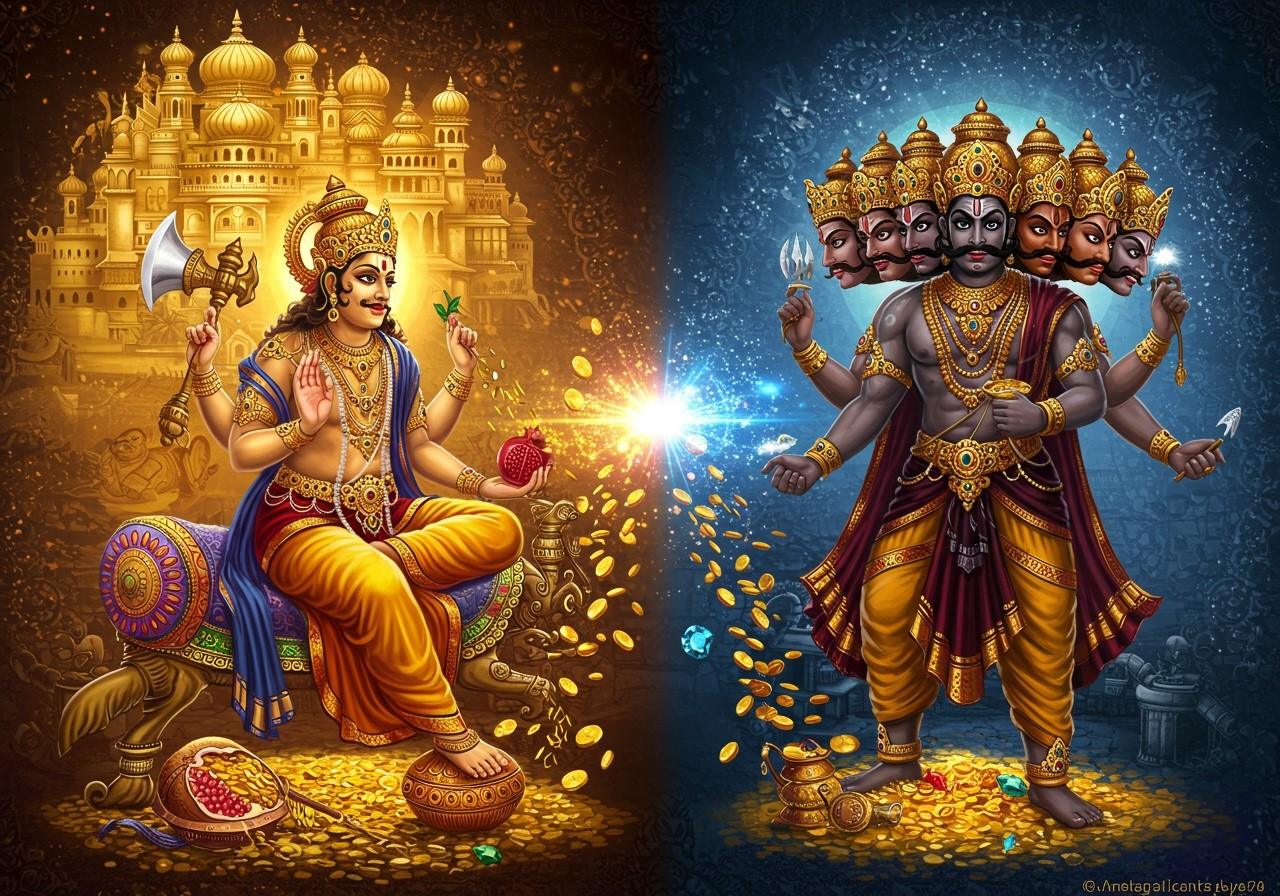
In Hindu mythology, the narratives of Kubera and Ravana offer valuable insights into the complexities of family, ambition, and righteousness. These figures, deeply embedded in Hindu tradition, provide lessons that resonate even today. Exploring their relationship allows us to delve into the interplay of divine and demonic forces, and the consequences of unchecked desires.
Unraveling the Connection: Kubera and Ravana’s Kinship
Kubera and Ravana’s story is one of intertwined destinies, connected by blood yet divided by ambition. Kubera, the revered God of Wealth, was the son of Saint Vishrava and Ilavida. Vishrava also fathered Ravana, Kumbhakarna, Vibhishana, and Surpanakha with his other wife, Kaikesi, an Asura princess. This makes Kubera a step-brother to Ravana and his siblings. Some scriptures even suggest that Kubera and Vishrava were brothers, positioning Kubera as Ravana’s uncle. This complex familial relationship forms the backdrop of their dramatic story.
The Rise and Fall of Lanka’s Ruler
Kubera’s reign in Lanka began with divine blessings. Through dedicated penance, he earned the favor of Lord Brahma, who bestowed upon him unimaginable wealth, the magical Pushpaka Vimana, and the magnificent golden city of Lanka. However, this prosperity attracted the envious gaze of Ravana. Consumed by ambition, Ravana forcefully seized Lanka, the Pushpaka Vimana, and all of Kubera’s treasures. Kubera, a deity of wealth, not war, was unable to withstand Ravana’s might and was forced to relinquish his kingdom.
After his expulsion from Lanka, Kubera established a new abode near Mount Kailash, known as Alakapuri. Despite his loss, Kubera remained a powerful deity, symbolizing prosperity, righteousness, and resilience.
Ravana’s Reign of Terror and Downfall
Ravana’s acquisition of Lanka marked the beginning of his reign of terror. His arrogance and hunger for power led him down a path of destruction. He not only challenged the authority of the gods but also committed heinous acts, including the assault of Rambha, the wife of Kubera’s son, Nalakubera. This transgression brought upon him a terrible curse, foreshadowing his eventual downfall. Ravana’s lust for power ultimately led to his demise when he abducted Sita, the wife of Lord Rama. This act triggered a devastating war that resulted in Ravana’s death and the destruction of Lanka. The story of Ravana serves as a cautionary tale against the dangers of unchecked ambition and the importance of humility.
Poojn.in: Your Source for Spiritual and Cultural Items
Poojn.in, India’s leading online store for cultural and spiritual goods, offers a wide selection of products for your puja needs. Whether you seek items for Kubera puja to invite wealth and prosperity, or articles for Shiva puja, reflecting Ravana’s devotion to Lord Shiva, we have you covered. Explore our collection of authentic puja items, from copper yantras and Kubera coins to rudraksha malas and silver Shiva lingams.
Discover a wide range of incense sticks and dhoop stands perfect for creating a sacred atmosphere during your rituals. Poojn.in provides detailed product information, usage instructions, and secure payment options, ensuring a convenient and fulfilling shopping experience. Visit us today at www.poojn.in.
Key Takeaways from the Tale of Kubera and Ravana
- The Dangers of Ambition: Ravana’s insatiable desire for power led to his downfall, demonstrating the destructive nature of unchecked ambition. His story serves as a cautionary tale, reminding us to seek balance and humility in our pursuits. This narrative underlines the importance of moral boundaries, even in the quest for greatness.
- The Importance of Righteousness: Kubera’s steadfastness in righteousness, even in the face of adversity, highlights the strength of character and resilience. His story inspires us to maintain our integrity and uphold our values, even when facing challenges. His resilience serves as an example of how to maintain dignity and grace under pressure.
- The Complexity of Family Relationships: The story of Kubera and Ravana reveals the intricate dynamics that can exist within families. It shows how ambition and rivalry can strain even the closest of bonds. This complex interplay of relationships offers valuable lessons on navigating familial ties and resolving conflicts peacefully. It reminds us of the importance of empathy and understanding within our own family structures.
Frequently Asked Questions about Kubera and Ravana
How were Kubera and Ravana related? Kubera and Ravana were half-brothers, sharing the same father, Vishrava. This familial connection adds another layer to their conflict.
What led to the conflict between Kubera and Ravana? Ravana’s ambition to possess Lanka and the Pushpaka Vimana led to the conflict. He forcefully seized these possessions from Kubera, igniting a bitter rivalry.
Where did Kubera go after losing Lanka? After losing Lanka, Kubera relocated to Alakapuri, near Mount Kailash. He continued to be revered as the God of Wealth, demonstrating his resilience and enduring power.
What ultimately led to Ravana’s downfall? Ravana’s arrogance, misdeeds, and the abduction of Sita led to his downfall. His actions provoked a war with Lord Rama, resulting in his death and the destruction of Lanka.
Learn more about Hindu deities and their fascinating stories by exploring articles like Hinduism’s Global Reach, Hinduism: A Complete History and Origin, and Valmiki Ramayana: Author, Poet, Sage at Poojn.in.

